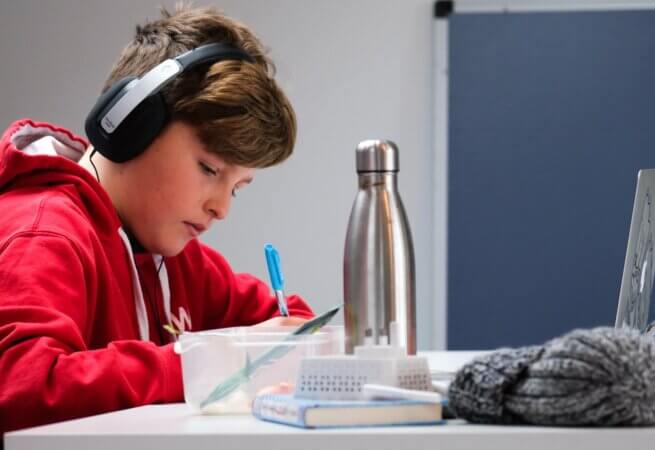I set down four alarm clocks next to the cash register. The young cashier squinted at my purchases, as if to say, “You know nobody uses these anymore, right?” Yeah, I know. But I had declared every bedroom in my home a phone-free zone. Again.
I’m pretty sure I had done this once before. But you know how you can dust a room one week, and a week later the same room needs dusting again? I think family phone rules are the same. We can state the boundaries one week, and a week or maybe a year later, they might need restating.
As a mom of older teens, I felt like I was pushing against an invisible tsunami of technology. Between my teenagers having virtual learning and me working from home, technology had seeped into every corner of our house. I was desperate to make our home a sanctuary from the world’s incessant noise. But how?
How could I help my teens navigate a digital landscape that perpetuates a constant stream of noise? How could I encourage my teens to make healthy choices between their online life and “real life?” To raise young adults who love God in a world that is saturated with digital content, we need a guiding principle that honors the finite creatures we are.
The overflow principle
Most of us can’t exactly go the way of the luddite, so we each have to figure out a way to incorporate digital technology into our lives without allowing it to take over. But as soon as someone creates a list of dos, don’ts, or life hacks to follow, this may or may not work for everyone.
This is where the overflow principle has taken priority in my life.
When our digital participation stems from the overflow of our tangible lives, our online involvement remains tethered to the real world and reflects greater health and integrity. We can then establish phone boundaries that work for each of us by prioritizing the overflow principle.
In the words of Jesus…
Jesus explained the overflow principle when he said, “For the mouth speaks from the overflow of the heart” (Matthew 12:34 CSB). In other words, whatever is in our hearts will eventually come out through our mouths. Put another way, what is invisible on the inside will be made visible on the outside. It’s only a matter of time.
To illustrate this truth, Jesus gave the example of a fruit tree. A good tree will produce good fruit, and a bad tree will produce bad fruit. Again, what is on the inside will be made known on the outside.
This biblical principle applies to our online lives as well. When we are committed to growing strong relationships with the people we live with, work with and go to church with, from that wellspring of relational life we are able to give to others, even in a digital context.
But when this gets backwards — when a person invests first and foremost in online spaces — then unhealth ensues as technology takes centerstage and makes itself ever-present, even in the home.
Internet-free zones
How does this impact teens?
For many teenagers, the digital world is quickly taking precedent over the tangible world. As parents, however, we can be intentional to create spaces of love and laughter in our homes, where teens feel a sense of safety. We can turn our homes into a sanctuary of sorts, where young adults don’t feel the need to be constantly “on” or constantly connected with their peers through shared online content.
We can do this by creating a haven at home where there are designated internet-free zones. Then we can fill those spaces with family memories, like gathering around the table for meals or playing fun board games together. In these ways, we are setting an example for our kids by prioritizing being together over being online.
We may not think this has much effect, but we are essentially creating a clear contrast our kids will readily recognize. They will feel the comfort of home when they instinctively know they don’t have to be “on” once they walk through our front doors.
When God is the center
I have no idea what happened to our old alarm clocks. Somehow they vanished as the cooler, more convenient “alarm clocks” replaced them. So, it was time to reestablish the phone boundaries in our house. For us, this simply meant no phones in bedrooms, as well as the dinner table. Phones can charge on the kitchen counter; they don’t need to follow us from room to room.
While these kinds of phone boundaries are helpful, it’s important to remember that our lives will always flow from the center outward. When God is at the very center of our being and we place a greater emphasis on investing in real relationships and tangible activities, we’re less inclined to want our phones within constant reach, which makes the boundary setting so much easier.
So, as we move forward in establishing phone and internet boundaries that work for us as parents, we begin with the overflow principle.
Because the pings on our phones are never as important as the people we’re with.
Then, as we prioritize the local-tangible over the global-digital, our friends and family members can trust that the words and pictures we do share online come from the overflow of a rich and beautiful life, one that is deeply connected with the humans we interact with every day.
And when we have this rightly ordered in our lives, our online interactions become a reflection of genuine health, and our homes become a sanctuary from a loud and restless world.
This article is an adapted excerpt from Sanctuary: Cultivating a Quiet Heart in a Noisy and Demanding World by Denise J. Hughes
Consider a few extra resources:
- Six steps to lead your child in emotional and mental help
- Why teens are sadder, lonelier, and more depressed than ever before?
- Helping your teen identify their feelings



